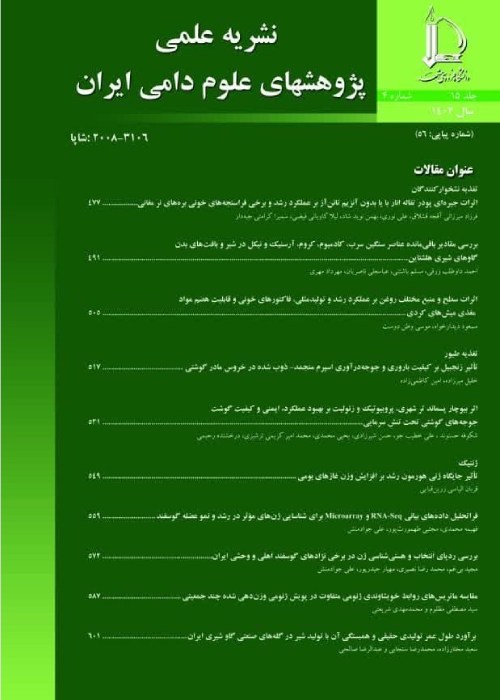Effects of Biochar with Vitamin C as Replacement of Dietary Mineral Supplements on Performance and Egg Shell Quality of Laying Hens
Author(s):
Article Type:
Research/Original Article (دارای رتبه معتبر)
Abstract:
Introduction
Humate material was used as feed additives in poultry nutrition. The biochar as a useful fertilizer in agriculture industry is a humate material that increases growth of plants. This fertilizer can as an additive be use in the poultry and animals feed, due to has many minerals material and two organic acid (humic and fulvic) in its compound. The reduce cost of diet in poultry industry for egg production, is an important goal. The biochar as a dietary additive is easily derived from burn organic material and agriculture byproduct. In recent years, several studies have been conducted to determine the effect of humic acid as an additive on performance poultry. In a study, dietary supplementation of laying hens with humic acid improves the performance and egg shape index. Investigating the effect of biochar as replacement of dietary mineral supplements on performance and egg shell quality of laying hens is rare. One of the properties of vitamin C (VC) is chelating properties, and with this property, it increases the intestinal absorption of minerals in birds. Therefore, this study was conducted to investigate the effects of biochar (as a humate material) in five levels and vitamin C in two levels as replacement of dietary mineral supplements on performance and egg shell quality of laying hens. Materials and Methods
The current experiment was conducted to evaluate the effects of biochar with vitamin C as replacement of mineral supplement in diet of laying hen. A total of 400 laying hens of Bovans strain, were randomly assigned to 10 experimental groups in a 5×2 factorial treatment arrangement with five replications and eight laying hens in each replicate during three 30-day periods. Factors tested included biochar levels (0, 25, 50, 75, and 100% replacement with mineral supplements of diet) and vitamin C levels (0 and 100 mg/kg of diet). The feed intake, feed conversion ratio and daily weight gain were determined. Records of the feed intake were taken on by daily basis. Feed conversion ratio was calculated as grams of feed consumed to grams of egg mass. To determine egg shell quality characteristics, the shape index was calculated by using egg height and egg width. The egg specific gravity was evaluated by floating eggs in soluble of water and salt with different density. The egg breaking strength was measured by resistance meter.Results and Discussion
Replacing biochar levels from 25 to 100% mineral supplement of diet, with and without vitamin C, had no effect on performance characteristics (feed intake, feed conversion ratio and daily weight gain) and egg shell quality traits (egg shape index, egg specific gravity and egg breaking strength) in total of period of the experiment (50 to 61 weeks of age). The levels of 25 and 50% biochar, plus vitamin C in diet decreased feed intake in the first period. Whereas, the level of 75% biochar, plus vitamin C in diet increased feed intake in this period. The egg shape index with the addition of vitamin C in diet decreased in the third period. The reason of no significant effect of biochar on performance and egg shell quality can be due to the different sources and amounts of biochar in poultry diet. The reason of no significant effect of vitamin C on performance and egg shell quality in laying hens can be due to the bird environmental temperature. The use of vitamin C in diet of laying hens under heat stress improves their performance. Whereas, this study was performed in normal environmental temperature. The second reason is the chelating properties of vitamin C, that can be increased absorption minerals in birds intestinal. But due to advanced digestive tract of laying hens, maybe decrease its properties. Conclusion
The results of present study showed that biochar across all levels had similar cost with control group, and it had no effect on egg shell quality and performance of laying hens. There was no significant interaction between biochar and vitamin C regrding to performance, egg shell quality traits and cost of diet during 50 to 61 weeks of age, too. Therefore, biochar can be completely replaced with dietary mineral supplements of laying hens due to its low cost, high availability, easy production without adverse effects on performance and egg quality traits.Keywords:
Language:
Persian
Published:
Iranian Journal of Animal Science Reaserch, Volume:14 Issue: 3, 2022
Pages:
399 to 412
magiran.com/p2513243
دانلود و مطالعه متن این مقاله با یکی از روشهای زیر امکان پذیر است:
اشتراک شخصی
با عضویت و پرداخت آنلاین حق اشتراک یکساله به مبلغ 1,390,000ريال میتوانید 70 عنوان مطلب دانلود کنید!
اشتراک سازمانی
به کتابخانه دانشگاه یا محل کار خود پیشنهاد کنید تا اشتراک سازمانی این پایگاه را برای دسترسی نامحدود همه کاربران به متن مطالب تهیه نمایند!
توجه!
- حق عضویت دریافتی صرف حمایت از نشریات عضو و نگهداری، تکمیل و توسعه مگیران میشود.
- پرداخت حق اشتراک و دانلود مقالات اجازه بازنشر آن در سایر رسانههای چاپی و دیجیتال را به کاربر نمیدهد.
In order to view content subscription is required
Personal subscription
Subscribe magiran.com for 70 € euros via PayPal and download 70 articles during a year.
Organization subscription
Please contact us to subscribe your university or library for unlimited access!


